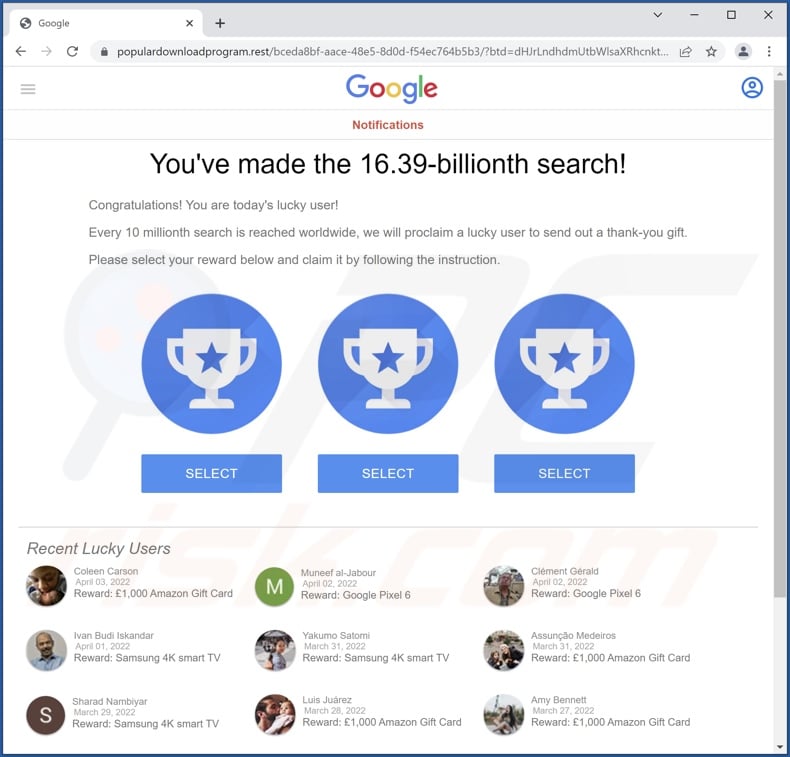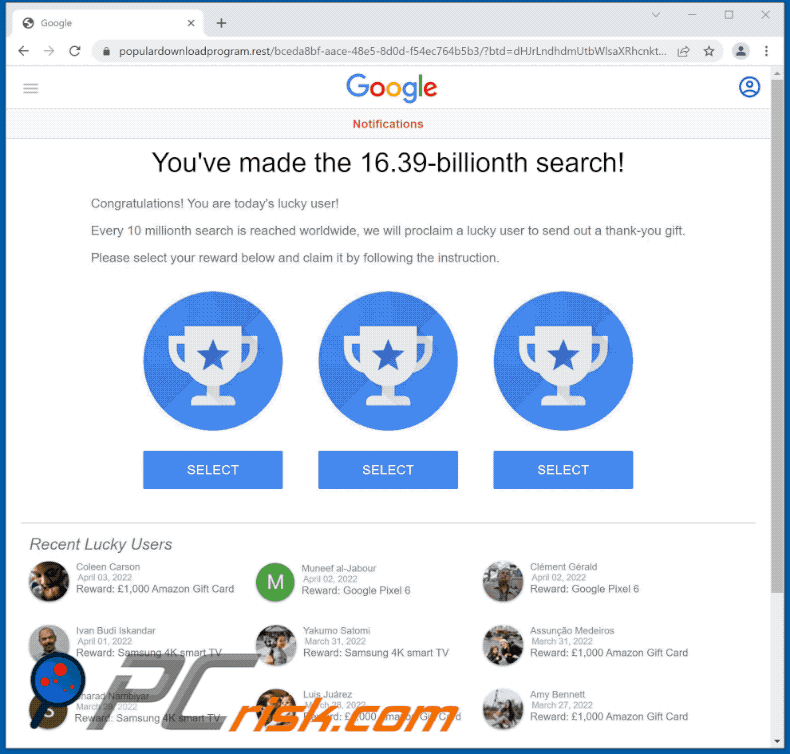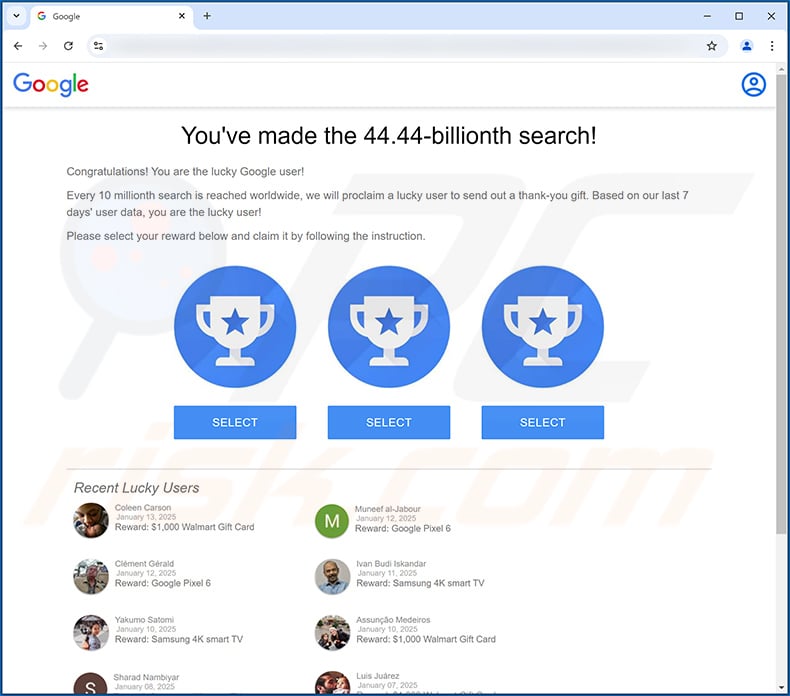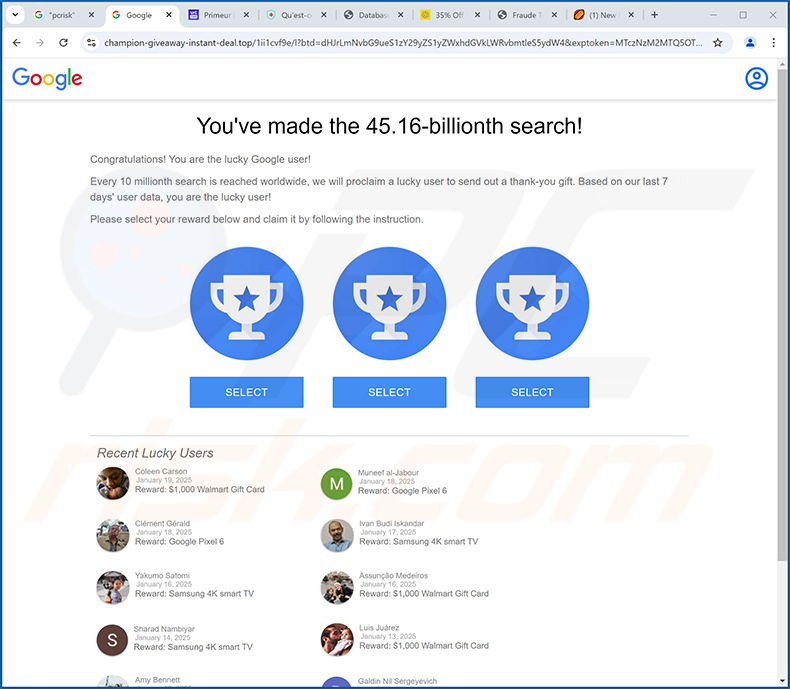Avoid getting scammed by "You've made the 16.39-billionth search!" websites
Phishing/ScamAlso Known As: You've made the 16.39-billionth search! pop-up
Get free scan and check if your device is infected.
Remove it nowTo use full-featured product, you have to purchase a license for Combo Cleaner. Seven days free trial available. Combo Cleaner is owned and operated by RCS LT, the parent company of PCRisk.com.
What is "You've made the 16.39-billionth search!"?
During a routine inspection of shady websites, our researchers discovered the "You've made the 16.39-billionth search!" scam. It uses content (names/graphics) associated with the Google search engine, thereby implying that this reward is given or sponsored by Google LLC. In fact, this scam is in no way associated with this search engine or the multinational technology company.
"You've made the 16.39-billionth search!" operates a phishing scam and might also try to trick victims into making bogus purchases.

"You've made the 16.39-billionth search!" scam overview
When we accessed a website running this scam, it claimed that a reward will be given to the user since they had made the "16.39-billionth search". To claim the "thank-you gift", the user must first press one of the three "SELECT" buttons displayed below images of trophy cups. When we selected one of the options, it revealed the reward to be a 1000£ Amazon gift card, and the other potential options included a TV and a smartphone.
Afterward, the scam displayed a pop-up window stating that the gift card was in stock and receiving it will require users to provide their contact information. Once we clicked the "CLAIM NOW" button, it caused a redirect to a different website.
This page affirmed the availability of the 1000£ Amazon gift card, but the small print informed that it could be claimed "upon completion of purchase requirements". This implies that users may be asked to make fake purchases, thereby either transferring the scammers some amount of money (for a product they will not receive) and/or disclosing their financial data (e.g., banking account details, credit card numbers, etc.).
The webpage also contained a questionnaire (which are often incorporated in scams) and likely results in the user being asked to provide personal information (e.g., name, birthdate, occupation, address, email, telephone number, etc.).
The goal of all scams is to generate revenue. "You've made the 16.39-billionth search!" may do so by selling or abusing disclosed information and/or by acquiring funds through this deception.
To summarize, by trusting such scams, victims can experience severe privacy issues, financial losses, and even identity theft.
| Name | You've made the 16.39-billionth search! pop-up |
| Threat Type | Phishing, Scam, Social Engineering, Fraud |
| Fake Claim | Users will receive a reward/ thank-you gift. |
| Disguise | Scam is presented as a reward program held by Google. |
| Related Domains | populardownloadprogram[.]rest, nighthawkcolossusdaredevilsunfire[.]top |
| Detection Names (populardownloadprogram[.]rest) | Avira (Phishing), CyRadar (Malicious), Fortinet (Phishing), Netcraft (Malicious), alphaMountain.ai (Suspicious), Full List Of Detections (VirusTotal) |
| Serving IP Address (populardownloadprogram[.]rest) | 172.67.138.222 |
| Distribution methods | Compromised websites, rogue online pop-up ads, potentially unwanted applications. |
| Damage | Loss of sensitive private information, monetary loss, identity theft, possible malware infections. |
| Malware Removal (Windows) |
To eliminate possible malware infections, scan your computer with legitimate antivirus software. Our security researchers recommend using Combo Cleaner. Download Combo CleanerTo use full-featured product, you have to purchase a license for Combo Cleaner. 7 days free trial available. Combo Cleaner is owned and operated by RCS LT, the parent company of PCRisk.com. |
Pop-up scam examples
We have analyzed countless online scams. "Chrome Search Contest 2022", "You've made the 9.68-billionth search", "You've Made The 5-billionth Search", and "Chrome search contest 2021" are a few examples of those thematically identical to "You've made the 16.39-billionth search!"; while "Your phone is severly damaged by viruses", "Ronin Wallet scam", and "Mcafee - Security Warning" are a couple of our most recent finds.
There are thousands of scams on the Web, and they use a wide variety of models to gain and subsequently abuse users' trust. Therefore, we strongly recommend exercising caution when browsing.
How did I open a scam website?
Most users enter scam sites inadvertently. They can be accessed by clicking intrusive advertisements or spam browser notifications. Webpages that employ rogue advertising networks can force-open deceptive pages upon access or when buttons, links, ads, or other hosted content is clicked.
Adware is also known to promote scams. This software can do so by displaying advertisements that redirect to scam websites or by force-opening them without prompt. Mistyping a website address (URL) can also result in a redirect landing on a deceptive page.
How to avoid visiting scam websites?
We advise against visiting sites that offer pirated content or other suspect services (e.g., Torrenting, illegal streaming/downloading, etc.) since they are typically monetized through rogue advertising networks, which commonly push online scams.
The same extends to spam browser notifications that are delivered with user permission (i.e., when "Allow", "Allow Notifications", or similar options are selected). We recommend ignoring notification delivery requests or denying them (i.e., clicking "Block", "Block Notifications", etc.).
Furthermore, we advise downloading only from official/trustworthy sources and approaching installation with caution (i.e., reading terms, using "Custom/Advanced" settings, opting-out of all additions, etc.) - to avoid allowing adware or other harmful software into your device.
If your computer is already infected, we recommend running a scan with Combo Cleaner Antivirus for Windows to automatically eliminate all threats.
Text presented in the "You've made the 16.39-billionth search!" scam pop-up:
Notifications
You've made the 16.39-billionth search!
Congratulations! You are today's lucky user!
Every 10 millionth search is reached worldwide, we will proclaim a lucky user to send out a thank-you gift.
Please select your reward below and claim it by following the instruction.
The appearance of "You've made the 16.39-billionth search!" pop-up scam (GIF):

Example of another similar scam page claiming that user has made 44.44 billionth search:

Text presented within:
You've made the 44.44-billionth search!
Congratulations! You are the lucky Google user!Every 10 millionth search is reached worldwide, we will proclaim a lucky user to send out a thank-you gift. Based on our last 7 days' user data, you are the lucky user!
Please select your reward below and claim it by following the instruction.
Example of another similar scam page claiming that user has made 45.16 billionth search:

Instant automatic malware removal:
Manual threat removal might be a lengthy and complicated process that requires advanced IT skills. Combo Cleaner is a professional automatic malware removal tool that is recommended to get rid of malware. Download it by clicking the button below:
DOWNLOAD Combo CleanerBy downloading any software listed on this website you agree to our Privacy Policy and Terms of Use. To use full-featured product, you have to purchase a license for Combo Cleaner. 7 days free trial available. Combo Cleaner is owned and operated by RCS LT, the parent company of PCRisk.com.
Quick menu:
- What is You've made the 16.39-billionth search! pop-up?
- How to identify a pop-up scam?
- How do pop-up scams work?
- How to remove fake pop-ups?
- How to prevent fake pop-ups?
- What to do if you fell for a pop-up scam?
How to identify a pop-up scam?
Pop-up windows with various fake messages are a common type of lures cybercriminals use. They collect sensitive personal data, trick Internet users into calling fake tech support numbers, subscribe to useless online services, invest in shady cryptocurrency schemes, etc.
While in the majority of cases these pop-ups don't infect users' devices with malware, they can cause direct monetary loss or could result in identity theft.
Cybercriminals strive to create their rogue pop-up windows to look trustworthy, however, scams typically have the following characteristics:
- Spelling mistakes and non-professional images - Closely inspect the information displayed in a pop-up. Spelling mistakes and unprofessional images could be a sign of a scam.
- Sense of urgency - Countdown timer with a couple of minutes on it, asking you to enter your personal information or subscribe to some online service.
- Statements that you won something - If you haven't participated in a lottery, online competition, etc., and you see a pop-up window stating that you won.
- Computer or mobile device scan - A pop-up window that scans your device and informs of detected issues - is undoubtedly a scam; webpages cannot perform such actions.
- Exclusivity - Pop-up windows stating that only you are given secret access to a financial scheme that can quickly make you rich.
Example of a pop-up scam:

How do pop-up scams work?
Cybercriminals and deceptive marketers usually use various advertising networks, search engine poisoning techniques, and shady websites to generate traffic to their pop-ups. Users land on their online lures after clicking on fake download buttons, using a torrent website, or simply clicking on an Internet search engine result.
Based on users' location and device information, they are presented with a scam pop-up. Lures presented in such pop-ups range from get-rich-quick schemes to fake virus scans.
How to remove fake pop-ups?
In most cases, pop-up scams do not infect users' devices with malware. If you encountered a scam pop-up, simply closing it should be enough. In some cases scam, pop-ups may be hard to close; in such cases - close your Internet browser and restart it.
In extremely rare cases, you might need to reset your Internet browser. For this, use our instructions explaining how to reset Internet browser settings.
How to prevent fake pop-ups?
To prevent seeing pop-up scams, you should visit only reputable websites. Torrent, Crack, free online movie streaming, YouTube video download, and other websites of similar reputation commonly redirect Internet users to pop-up scams.
To minimize the risk of encountering pop-up scams, you should keep your Internet browsers up-to-date and use reputable anti-malware application. For this purpose, we recommend Combo Cleaner Antivirus for Windows.
What to do if you fell for a pop-up scam?
This depends on the type of scam that you fell for. Most commonly, pop-up scams try to trick users into sending money, giving away personal information, or giving access to one's device.
- If you sent money to scammers: You should contact your financial institution and explain that you were scammed. If informed promptly, there's a chance to get your money back.
- If you gave away your personal information: You should change your passwords and enable two-factor authentication in all online services that you use. Visit Federal Trade Commission to report identity theft and get personalized recovery steps.
- If you let scammers connect to your device: You should scan your computer with reputable anti-malware (we recommend Combo Cleaner Antivirus for Windows) - cyber criminals could have planted trojans, keyloggers, and other malware, don't use your computer until removing possible threats.
- Help other Internet users: report Internet scams to Federal Trade Commission.
Frequently Asked Questions (FAQ)
What is a pop-up scam?
Pop-up scams are essentially deceptive messages that trick users into performing certain actions, e.g., disclosing private information, making monetary transactions, downloading/installing applications, and so on.
What is the purpose of a pop-up scam?
Cyber criminals profit through pop-up scams. The revenue can come from funds obtained via deception, abuse or sale of private data, (likely unreliable/harmful) software promotion, malware proliferation, and so on.
I have provided my personal information when tricked by a pop-up scam, what should I do?
If you have disclosed account credentials - immediately change the passwords of all potentially compromised accounts and inform their official support. And if you have revealed other private data such as ID card details, credit card numbers, etc. - contact the corresponding authorities without delay.
Why do I encounter fake pop-ups?
Pop-up scams are run on deceptive sites, which are rarely accessed intentionally. Most users enter them through redirects caused by websites using rogue advertising networks, spam browser notifications, mistyped URLs, intrusive ads, or installed adware.
Will Combo Cleaner protect me from pop-up scams?
Combo Cleaner is designed to scan visited websites and issue warnings if they are detected as deceptive or malicious. Sites that promote pop-up scams also fall under this category; hence, you will be warned immediately, and access to the website will be restricted.
Share:

Tomas Meskauskas
Expert security researcher, professional malware analyst
I am passionate about computer security and technology. I have an experience of over 10 years working in various companies related to computer technical issue solving and Internet security. I have been working as an author and editor for pcrisk.com since 2010. Follow me on Twitter and LinkedIn to stay informed about the latest online security threats.
PCrisk security portal is brought by a company RCS LT.
Joined forces of security researchers help educate computer users about the latest online security threats. More information about the company RCS LT.
Our malware removal guides are free. However, if you want to support us you can send us a donation.
DonatePCrisk security portal is brought by a company RCS LT.
Joined forces of security researchers help educate computer users about the latest online security threats. More information about the company RCS LT.
Our malware removal guides are free. However, if you want to support us you can send us a donation.
Donate
▼ Show Discussion